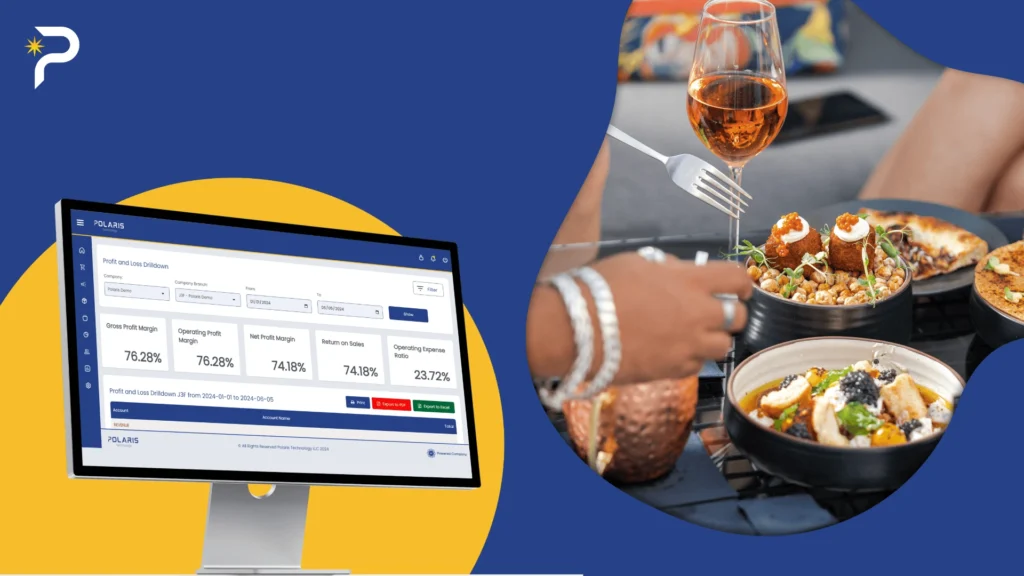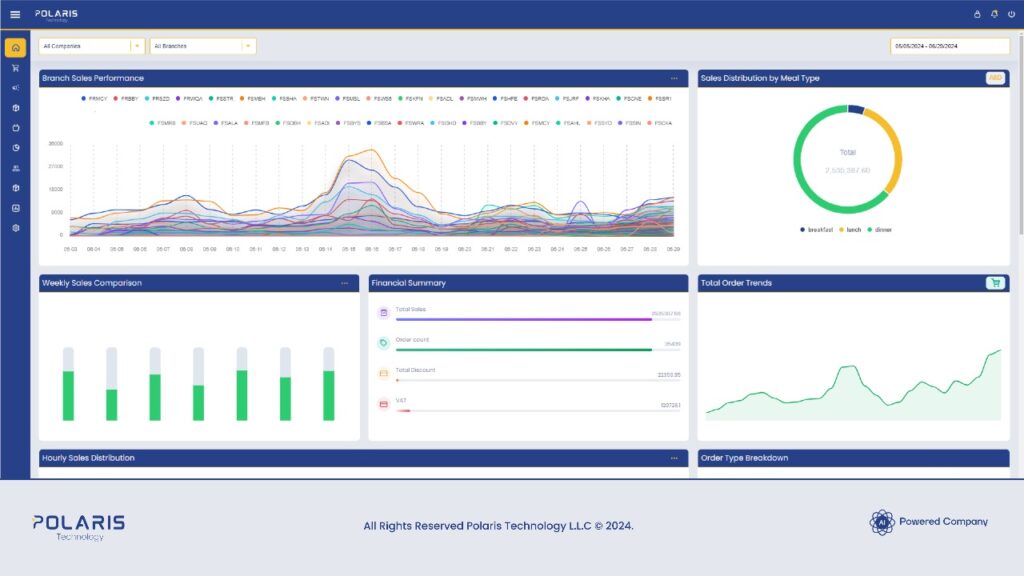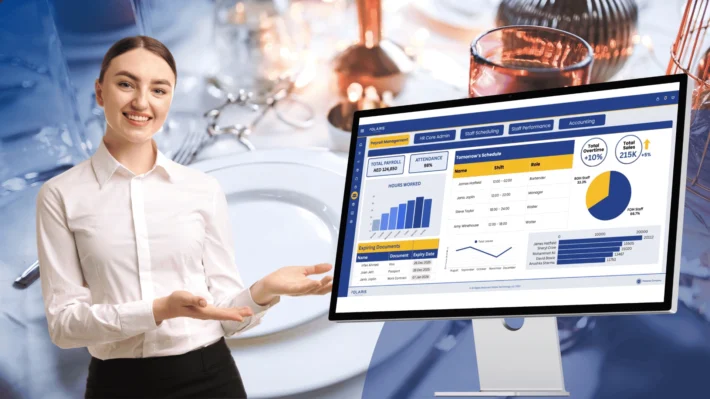Top Five Benefits of Using a Restaurant ERP in the UAE

Introduction
In recent times there has been an undeniable synergy between the evolution of the Food & Beverage (F&B) sector and technology. Various F&B trends are influencing tech advancements, or different innovations are finding their applicability for this industry. Enterprise resource planning (ERP) is definitely one of these areas. The use of an ERP system in the F&B, or restaurant industry is not new. However, in the recent years there have been emerging trends to indicate the benefits of using a restaurant ERP. Using restaurant ERP can results in up to 20% increased efficiency and revenue boost for restaurants that implement this technology.
This article breaks down the top five benefits of using a restaurant ERP software, to provide better clarity on how an ERP works to reach improved efficiency, higher revenue and optimized expenses for restaurant businesses.
What are the benefits of using a restaurant ERP system?
Faster service, higher revenue
First, a restaurant ERP is an automated solution, which means that it automates the tasks that you would be performing manually otherwise. You can automate order processing, inventory, or data analysis, which improves the speed of service.
The main feature of an ERP software is centralization. This allows staff to see information from across all departments in one place, hence reducing the time spent on checking scattered data across multiple systems and locations.
Furthermore, since the inventory system is automated within the ERP environment, staff can quickly know what’s available, reducing the wait time for customers.
Being able to serve customers faster, means increased revenue. The equation is simple here: the more customers you serve, the more money you make. Plus, the satisfaction of being served promptly often results in returning customers, which also adds up to your revenue.
Improved restaurant operations efficiency
When using a restaurant ERP software in Dubai or anywhere in the world, many of the previously manually handled tasks are automated. This includes data entry, a cumbersome activity that leaves your business vulnerable to human errors that can impact your financial accuracy and overall performance. The ERP solution made it possible to replace this task with automated processes, such as scanning codes instead of writing products, when managing the inventory, for instance.
Order taking or purchase management are also automated with a restaurant ERP system. This increases productivity, leaving more free time for employees to focus on improving the quality of the dishes, or the client interaction.
Restaurant cost saving
In a restaurant business, inventory management is one of the most challenging operations, which can also cause unnecessary costs, as a result of overstocking, which often leads to spoilage. When using a restaurant ERP, you can easily manage this challenge, by aligning the demand with supply.
By analyzing sales data available in the same system, you can identify the most popular menu items and the least ordered ones. This allows you to manage purchases based on demand, reducing or completely eliminating items that don’t feature in your most requested dishes.
With real-time insights, you can always be in control of your restaurant’s expenses. This allows you to first identify the areas of high costs. Second, it prompts you to make informed decisions on reducing those costs. In addition, an advanced feature of an ERP system, AI-powered food cost calculator, allows you to use artificial intelligence to analyze your data for you, telling you how you can reduce the food cost, to reach the ideal food cost formula of 80% profitability vs 20% costs.
Real-time restaurant analytics
The value of real-time restaurant analytics is not fully recognized in the F&B industry. However, knowing the numbers across all your restaurant’s departments can help you optimize your profits and better manage your expenses. Instead of relying on guts or intuition to run your business, accurate data can guide your decisions.

Thinking about placing a new purchase order for a new kitchen equipment? You need to have all the facts, to understand whether it is the right moment. Check your expenses (rent, raw materials, labor costs, operations costs, etc.) , versus your sales. Then see how much cash flow you have available. But this is only possible when you are able to get real-time insights from your system. Ideally, you would be able to get all these data from a single system that measures all your data points.
Only a restaurant ERP system can show you a 360 degree view of your business. It presents you the financial health of your business, so you can understand whether you’re earning or losing. This will help you make the right adjustments to optimize your business, or even make big decisions at the right time, about where your business is headed.
With the AI-driven insights from Polaris ERP you can make comparisons between past data, to check the overall evolution of your sales or expenses. Not only will this help you see what’s selling best, but will help you spot areas of high costs. It will also guide you on how to reduce those costs and gain higher profitability.
Accommodates restaurant scalability and growth
An important characteristic of an ERP system is its agility, and suitability to various types of businesses. When talking about the F&B industry, this means it can be suitable for any type of restaurant, from cloud kitchens to full service, fine dining, or fast dining restaurants, as well as quick service, cafes, bars and lounges.
Not only this, but it can manage multiple branches and multiple cuisines for the same F&B business. The ERP system is gathering data from across all locations, helping you interpret and analyze them. This lets you understand what location needs more attention to become more profitable, or better optimize the expenses.
With the real-time insights feature, you can access relevant data to determine if it’s the right time for your business to expand. This is something that other restaurant systems often struggle to do accurately. Additionally, as your business grows, an ERP system remains adaptable. It has the flexibility to scale with your needs and ensuring that it never becomes obsolete.
By automating processes and centralizing information, an ERP system frees up your team to focus on strategic growth initiatives. Whether you’re adding new locations, launching new menu items, or venturing into new markets, an ERP provides the support and flexibility necessary for sustainable growth.
Adopting a Restaurant ERP Software in the UAE
The UAE’s fast-growing, diverse F&B market demands smarter restaurant management, which is why a restaurant ERP is the best solution for this market. With eclectic menus, rising supplier costs, and the boom of delivery platforms, restaurants need better control across operations. A restaurant ERP like Polaris ERP helps improve menu management, track ingredient costs, and consolidate all delivery orders into one easy-to-use platform – giving businesses the visibility they need to scale efficiently.
In short, an ERP system not only accommodates your current operations but also positions you for future success, ensuring you’re always ready for the next step in your growth journey.
You may also be interested in:
If you want to learn more about how a restaurant ERP can help your F&B business grow, get in touch!
Book a free consultation with our expert team today!
Contact Us & Book A Demo
3 Comments
Comments are closed.




[…] Top Benefits of Restaurant ERP Software […]
[…] Benefits of Using a Restaurant ERP in the UAE […]
[…] issues can lead to financial losses, reputational damage, and missed opportunities, which is why a centralized ERP software is crucial for modern restaurant […]